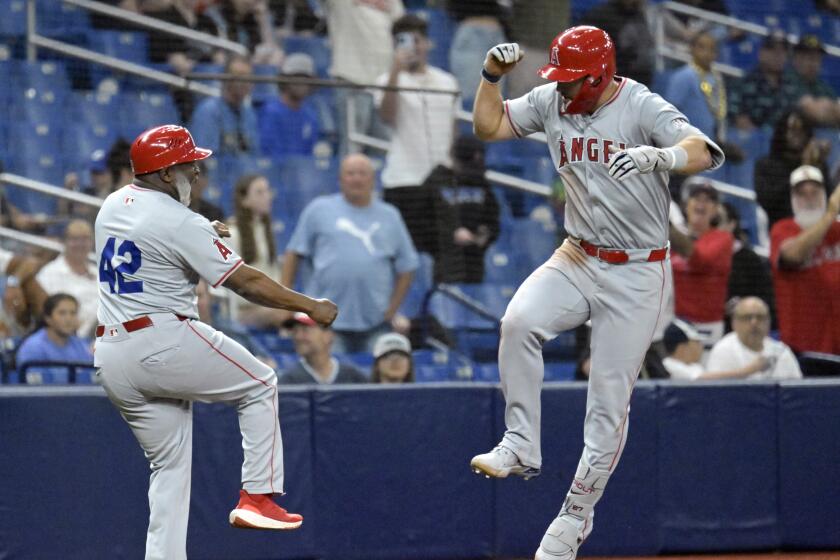Old news on match-fixing is still bad news
When Europol, the European Union’s police agency, announced last week it had uncovered a massive corruption ring that had infiltrated soccer on five continents, some reacted with alarm.
Others, like FIFA President Sepp Blatter, whose organization knows a little something about corruption, simply yawned. This, after all, was yesterday’s news. Many of the 680 cases of match-fixing Europol cited have already been prosecuted.
“Most of the matches which they put in this tray, 600 or 800, have already been analyzed, dealt with and even were at court,” Blatter told reporters.
In other words, move along, there’s nothing to see here. And he’s right.
Last month FIFA, world soccer’s governing body, handed down lifetime bans to 41 South Korean players and officials charged with prearranging matches. A month before that the president of the South African Football Assn. was suspended after an investigation into match-fixing prior to the 2010 World Cup. And other recent probes have found wrongdoing in Turkey, Italy, Israel, Finland, Greece, Nicaragua, Guatemala, El Salvador, China, Thailand, Zimbabwe, Canada and Vietnam, to name just a few.
But until the Europol report, those cases tended to be looked at as individual — if not isolated — incidents. Group them together, though, and it’s clear the level of corruption and rot in world soccer has reached alarming levels. And not everyone is taking that as cavalierly as Blatter.
“It’s a disease and a threat on a worldwide basis,” Jerome Valcke, FIFA’s general secretary, told CNN last month. “It’s not just about Africa. It is in Asia, it is in Europe, it is in North America, it is in Canada, it is in South America. It’s all around the world that this match-fixing, or match manipulation, is active.”
Part of the problem is that global soccer — and the wagering associated with it — might now be too big to tame. FIFA regulates 208 national soccer federations, each governing league and national teams over several age groups. Taken together, the number of pro and national teams worldwide exceeds 10,000.
Any of those can be targeted by crime syndicates who are gaming a sports wagering business that Interpol estimates handles $1 trillion worth of transactions annually. With 70% of those bets being placed on soccer, the sport has become an irresistible target.
“Globalization has really made this problem,” says Scott Minto, director of San Diego State’s Sports Business MBA program and a guest lecturer at the European University of Madrid in Spain. “In years past you wouldn’t have the results right away of a match in Eastern Europe. But now you can get there, you can communicate easily, you can transfer funds.”
The way it typically works is a match fixer connects with a local person knowledgeable about a certain team or league, who then identifies a player or referee believed to be susceptible to a bribe. The fixer steps forward, arranges a price, then makes huge bets on the match, typically through Asian gambling markets that process more daily transactions than the New York Stock Exchange.
Making it all the easier is the fact that, unlike other team sports, in soccer one person can dramatically impact the outcome of a match
“You’re talking about matches that are decided, typically, by one goal,” Minto says.
Played out against the backdrop of match-fixing, a surprising one-goal upset becomes not something to admire but something to fear. Did the underdog really win or did the favorite throw the match? Suspicion alone is enough to get you banned now, as Tunisian referee Slim Jdidi learned after a series of inexplicable calls went against Burkina Faso in a semifinal match of the African Nations Cup.
Burkina Faso won the match on penalty kicks, but Jdidi was still bounced from the tournament and given an indefinite suspension by the Confederation of African Football.
So could it happen here? If World Cup qualifiers and European Champions League matches can be targeted — as Europol’s 18-month probe found they were — is Major League Soccer safe?
Minto says yes … sort of. For starters, MLS teams don’t have the global footprint many teams in Europe have, so they aren’t likely to draw the kind of betting action that would make fixing a match profitable. And despite the relatively low salaries in MLS, the pay remains significantly higher than in many countries in Africa and Asia, making it less likely players or officials would risk a lifetime ban should they get caught.
Plus the league has been proactive, enrolling in an early warning system that monitors gambling worldwide, instituting a ban on the use of electronic communications from the locker room one hour prior to games and insisting match officials undergo rigorous background checks.
Still, Minto warns, “I don’t think we’re bribe-proof as a country.”
Not in the wake of what Europol chief Rob Wainwright termed “match-fixing on a scale we have not seen before.” And Friedhelm Althans, chief investigator for police in the German city of Bochum, told reporters that what we know now is probably the tip of the iceberg — a iceberg that could sink the sport.
That’s a concept even Blatter can understand.
“We’re fighting against that,” he said. “Because if matches are fixed there’s no more interest in going to watch football.”
twitter.com/ @kbaxter11
More to Read
Get our high school sports newsletter
Prep Rally is devoted to the SoCal high school sports experience, bringing you scores, stories and a behind-the-scenes look at what makes prep sports so popular.
You may occasionally receive promotional content from the Los Angeles Times.







